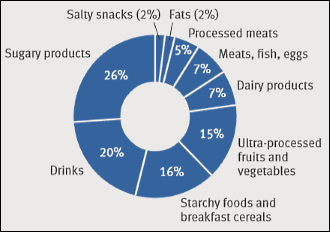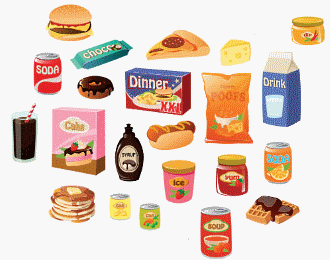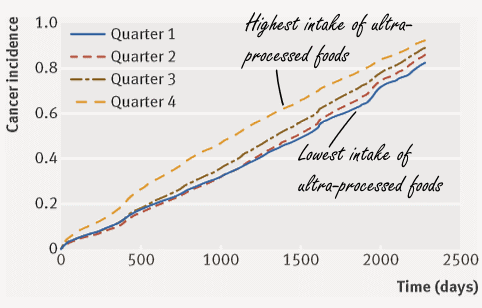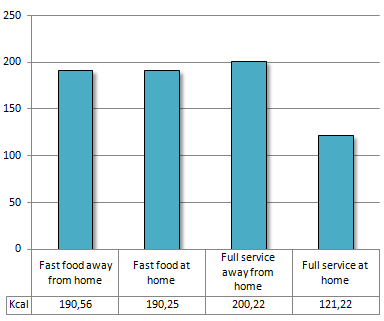|
The more junk from the food industry you eat, the greater your chance of cancer
The more foods you consume that have been manufactured by the food industry - and not by yourself - the greater your chance of cancer. French epidemiologists conclude this in a study that was published in BMJ.
Study
Researchers from the Sorbonne Université followed 104,980 adults from 2009 to 2017. The researchers were knew the diet of the study participants, and therefore knew how many ultra-processed foods they consumed. These are ready-to-eat foods that have assembled in food factories and hardly contain healthy substances. In a number of European countries, such as England, Ireland and Germany, half of the diet consists of these foods. [theguardian.com 2 Feb 2018]
In the US 58 percent of the diet consists of ultra-processed foods. [BMJ Open. 2016 Mar 9;6(3):e009892.]
The figure below shows which ultra-processed foods were present in the diet of the participants in the French study - and in what quantities.


Results
The more of their energy the study participants received through ultra-processed foods, the greater the chance that they were diagnosed with cancer. If the proportion of ultra processed foods in the diet increased by 10 percent, the chance of developing cancer increased by 12 percent.

The correlation between ultra-processed foods and cancer was still present when the researchers corrected for "smoking status, educational level, physical activity, height, body mass index, alcohol intake, family history or cancers, intake of fats, sodium, carbohydrates and Western dietary pattern (derived by factor analysis)."
So - although ultra-processed foods do contain a lot of salt, sugar and bad fats, their unhealthy nutritional composition doesn't fully explain how ultra-processed foods induce cancer. Something else is at play here.
If we, the ignorant compilers of this website, are allowed to make a guess: we suspect that during the production process of many ultra-processed foodstuffs
unhealthy advanced glycation end products [AGEs] are formed. Read more about AGEs here, here and here.
Conclusion
"To our knowledge, this study was the first to investigate and highlight an increase in the risk of overall - and more specifically breast cancer associated with ultra-processed food intake", the reserachers write.
"These results should be confirmed by other large scale, population based observational studies in different populations and settings. Further studies are also needed to better understand the relative effect of nutritional composition, food additives, contact materials, and neoformed contaminants in this relation."
"Rapidly increasing consumption of ultra-processed foods may drive an increasing burden of cancer and other non-communicable diseases. Thus, policy actions targeting product reformulation, taxation, and marketing restrictions on ultra-processed products and promotion of fresh or minimally processed foods may contribute to primary cancer prevention. Several countries have already introduced this aspect in their official nutritional recommendations in the name of the precautionary principle."
Source:
BMJ 2018;360:k322.
More:
Daily half hour of interval training cancels out the negative health effects of the worst imaginable diet 06.12.2017
On a diet and want to go out to eat? Go to the Greek, not the Italian restaurant 04.06.2016
Fitness foods make you fat 21.09.2015
Archives:
Cancer Prevention & Survival
Junk Food
 |
 |
 |
|
Restaurant food makes you just as fat as fast food
If you eat fast food regularly, you'll put on weight. As a rule fast food contains more calories than food you prepare yourself. But the same is true for meals you eat in restaurants.
|
Fructose makes you extra fat because it makes you lazy too
If you consume large amounts of sugar you'll not only get fatter, you'll also get fatter faster than if you consume large amounts of glucose. That's because fructose - one of the components of sugar - makes you lazy.
|
There are more calories in your food than you think
It happens to many, many slimmers who are trying to lose fat in a controlled way while maintaining muscle mass. They keep track of exactly how much they eat, and make sure that they consume a few hundred kcals less than they burn each day. But nothing happens.
|
|
|






